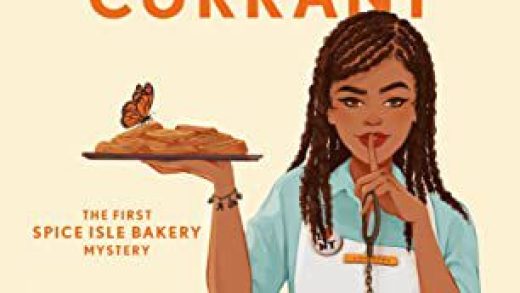We wouldn’t dream of abandoning our vast semi–annual Most Anticipated Book Previews, but we thought a monthly reminder would be helpful (and give us a chance to note titles we missed the first time around). Here’s what we’re looking out for this month. Let us know what you’re looking forward to in the comments!
Want to know about the books you might have missed? Then go read our most recent book preview. Want to help The Millions keep churning out great books coverage? Then sign up to be a member today.
How Much of These Hills Is Gold by C Pam Zhang: Zhang’s debut novel is a smart, beautiful, and intimate legend, not only of an immigrant family, but also of an expanding empire. One day, a pair of teenage siblings wake up to the sudden death of their father, a former prospector and coal miner. In the afterglow of the American gold rush, the two girls find themselves orphaned and vulnerable, and their very existence as immigrants is denied by this seemingly promising land. Carrying a stolen horse, their father’s body, and a pistol, they set off on their journey to give their father a proper burial. In their adventure, they witness the extermination of giant buffalos, encounter the ghosts of ruined nature, and discover family memories. How Much of These Hills Is Gold ambitiously examines the nation’s long neglected racialized past and, more importantly, brings those individuals to life again on the page, with their desire and anger, longing and frustration. (Jianan Qian)
 Notes from an Apocalypse by Mark O’Connell: With his Wellcome-Prize winning To Be a Machine, The Millions‘ own Mark O’Connell established himself as a poet laureate of human frailty, quixotism, and creativity as they manifest in the technologic age. Now, O’Connell travels across the world to tour bunkers and silos and interview all manner of people who are living as though the end of the world is upon us. Kirkus called it “A contribution to the doom-and-gloom genre that might actually cheer you up.” Long-time McConnell fans know it will be gloriously funny, incredibly alarming, empathetic, insightful, and beautifully written. (Lydia)
Notes from an Apocalypse by Mark O’Connell: With his Wellcome-Prize winning To Be a Machine, The Millions‘ own Mark O’Connell established himself as a poet laureate of human frailty, quixotism, and creativity as they manifest in the technologic age. Now, O’Connell travels across the world to tour bunkers and silos and interview all manner of people who are living as though the end of the world is upon us. Kirkus called it “A contribution to the doom-and-gloom genre that might actually cheer you up.” Long-time McConnell fans know it will be gloriously funny, incredibly alarming, empathetic, insightful, and beautifully written. (Lydia)
 Mothers Before by Edan Lepucki, ed.: Who was your mother before she became a mother? Lepucki, the New York Times-bestselling novelist of California and Woman No. 17 and indispensable contributing editor at The Millions, asks this question. She and her contributors offer answers in more than 60 essays and photographs, including work by Brit Bennett, Jennifer Egan, Jia Tolentino, Lisa See, and many others. The book builds on the popular Instagram account @mothersbefore. (Claire)
Mothers Before by Edan Lepucki, ed.: Who was your mother before she became a mother? Lepucki, the New York Times-bestselling novelist of California and Woman No. 17 and indispensable contributing editor at The Millions, asks this question. She and her contributors offer answers in more than 60 essays and photographs, including work by Brit Bennett, Jennifer Egan, Jia Tolentino, Lisa See, and many others. The book builds on the popular Instagram account @mothersbefore. (Claire)
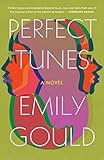 Perfect Tunes by Emily Gould: In her second novel, Gould tells the story of Laura, who comes to New York City in the early 2000s, fresh from Columbus, Ohio, with big plans to record an album and live out her dreams. Things don’t go as planned: Love (or lust) gets in the way. In this “sharply observant” (Publishers Weekly) novel by the author of Friendship, we get not only a bygone New York, but also: music, sex, motherhood, and ambition. Stephanie Danler says it’s an “intoxicating blend of music, love, and family from one of the essential writers of the internet generation.” P.S. there’s a great description of a penis. (Edan)
Perfect Tunes by Emily Gould: In her second novel, Gould tells the story of Laura, who comes to New York City in the early 2000s, fresh from Columbus, Ohio, with big plans to record an album and live out her dreams. Things don’t go as planned: Love (or lust) gets in the way. In this “sharply observant” (Publishers Weekly) novel by the author of Friendship, we get not only a bygone New York, but also: music, sex, motherhood, and ambition. Stephanie Danler says it’s an “intoxicating blend of music, love, and family from one of the essential writers of the internet generation.” P.S. there’s a great description of a penis. (Edan)
 The Dominant Animal by Kathryn Scanlan: If there were an ancestry of influences in writing, Scanlan’s would be charted as the love child of Gary Lutz and Diane Williams. She shares their linguistic obsessions, including an “outrageous attention to sound and structure that approaches the devotional.” Scanlan’s first book was the unexpected and heralded Aug 9—Fog, which she developed from a found text, a journal written by an elderly woman, which Scanlan then edited and rearranged into its current state. Of her forthcoming book of short stories, The Dominant Animal, Gary Lutz says, “Kathryn Scanlan comes to us as an oracle when we have never before been so desperately in need.” (Anne)
The Dominant Animal by Kathryn Scanlan: If there were an ancestry of influences in writing, Scanlan’s would be charted as the love child of Gary Lutz and Diane Williams. She shares their linguistic obsessions, including an “outrageous attention to sound and structure that approaches the devotional.” Scanlan’s first book was the unexpected and heralded Aug 9—Fog, which she developed from a found text, a journal written by an elderly woman, which Scanlan then edited and rearranged into its current state. Of her forthcoming book of short stories, The Dominant Animal, Gary Lutz says, “Kathryn Scanlan comes to us as an oracle when we have never before been so desperately in need.” (Anne)
 Godshot by Chelsea Bieker: Bieker’s debut novel, Godshot, takes her readers to the fertile fields of California, where divinities are seemingly as much of a bumper crop as avocados, except for adolescent Lacey May there’s lots of the former and little of the latter (or any other crop for that matter). The California of Godshot is in the midst of a brutal drought, and for the cult that Lacey May lives with, the faith of the indoctrinated turns towards their leader Pastor Vern who claims that he can once again make the rain come. What Lacey May brutally learns are the depths to which men can sink, the pain that they’re willing to inflict on women, and the promise of solidarity that can be approached as she goes on a road trip to find her exiled mother. A gothic phantasmagoria, Bieker’s book explores the ways in which cultish devotion in times of ecological catastrophe can seemingly push groups of people towards a social apocalypse—a novel eerily pertinent in 2020. (Ed S.)
Godshot by Chelsea Bieker: Bieker’s debut novel, Godshot, takes her readers to the fertile fields of California, where divinities are seemingly as much of a bumper crop as avocados, except for adolescent Lacey May there’s lots of the former and little of the latter (or any other crop for that matter). The California of Godshot is in the midst of a brutal drought, and for the cult that Lacey May lives with, the faith of the indoctrinated turns towards their leader Pastor Vern who claims that he can once again make the rain come. What Lacey May brutally learns are the depths to which men can sink, the pain that they’re willing to inflict on women, and the promise of solidarity that can be approached as she goes on a road trip to find her exiled mother. A gothic phantasmagoria, Bieker’s book explores the ways in which cultish devotion in times of ecological catastrophe can seemingly push groups of people towards a social apocalypse—a novel eerily pertinent in 2020. (Ed S.)
 The Moment of Tenderness by Madeleine L’Engle: Few fantasy writers had as indelible an influence on a certain tribe of bookish, introverted, curious children during the 20th century as the great L’Engle. Her classic A Wrinkle in Time, and the series of books that she wrote about the Wallace siblings and their journeys through time and space, remain not just classics of children’s literature, but an indelible exploration of authoritarianism as well. Now, like one of her characters who is able to transcend the fourth dimension, a collection of previously unpublished work written between her time in college and the publication from her first novel is being posthumously published as The Moment of Tenderness, after its rediscovery by her granddaughter. Some stories are clear drafts of later writing, and others are completely original, but for fans of L’Engle, they allow us a window into her process of writing fantasy, which she called the “one and only language in the world that cuts across all barriers of time, place, race, and culture.” (Ed S.)
The Moment of Tenderness by Madeleine L’Engle: Few fantasy writers had as indelible an influence on a certain tribe of bookish, introverted, curious children during the 20th century as the great L’Engle. Her classic A Wrinkle in Time, and the series of books that she wrote about the Wallace siblings and their journeys through time and space, remain not just classics of children’s literature, but an indelible exploration of authoritarianism as well. Now, like one of her characters who is able to transcend the fourth dimension, a collection of previously unpublished work written between her time in college and the publication from her first novel is being posthumously published as The Moment of Tenderness, after its rediscovery by her granddaughter. Some stories are clear drafts of later writing, and others are completely original, but for fans of L’Engle, they allow us a window into her process of writing fantasy, which she called the “one and only language in the world that cuts across all barriers of time, place, race, and culture.” (Ed S.)
 What Is Grass by Mark Doty: In the visionary 1855 poem “Song of Myself” from Walt Whitman’s prophetic collection Leaves of Grass, the good, grey poet imagines a child approaching the narrator of the verse (a variable “I” often conflated with the author) and asking “What is the Grass?” That line has been borrowed for the title of poet Mark Doty’s new reflection What Is Grass: Walt Whitman in My Life. Whitman is simultaneously the most singular and the most universal of poets, the most subjective and most objective, both “Walt” and a very “Kosmos.” It’s been said that no American poet can entirely ignore Whitman, and Doty is a reverential penitent before the greatest American poet, giving an account of how his own subjective experience intersects with that of the singer of “Song of Myself.” Both men are lovers of men; both men are New Yorkers; both men are poets. What Doty most shares with Whitman, however, is a heretic’s faith in language, both its promise and its failures. As Doty wrote of “he who’d written his book over and over, nearly ruining it, /so enchanted by what had first compelled him/ – for him the word settled nothing at all.” (Ed S.)
What Is Grass by Mark Doty: In the visionary 1855 poem “Song of Myself” from Walt Whitman’s prophetic collection Leaves of Grass, the good, grey poet imagines a child approaching the narrator of the verse (a variable “I” often conflated with the author) and asking “What is the Grass?” That line has been borrowed for the title of poet Mark Doty’s new reflection What Is Grass: Walt Whitman in My Life. Whitman is simultaneously the most singular and the most universal of poets, the most subjective and most objective, both “Walt” and a very “Kosmos.” It’s been said that no American poet can entirely ignore Whitman, and Doty is a reverential penitent before the greatest American poet, giving an account of how his own subjective experience intersects with that of the singer of “Song of Myself.” Both men are lovers of men; both men are New Yorkers; both men are poets. What Doty most shares with Whitman, however, is a heretic’s faith in language, both its promise and its failures. As Doty wrote of “he who’d written his book over and over, nearly ruining it, /so enchanted by what had first compelled him/ – for him the word settled nothing at all.” (Ed S.)
 Death in Her Hands by Ottessa Moshfegh: When it comes to evoking the jagged edge of contemporary anxiety there might not be a more insightful writer working today than Moshfegh. That is, if the boundless dark potential of the human psyche is your thing. If it’s not, this atmospheric, darkly comic tale of a pathologically lonely widow and the thrills lurking in her sylvan retreat might not be for you. But, sophisticated reader that you are, you’re not afraid of the dark. Right? (Il’ja)
Death in Her Hands by Ottessa Moshfegh: When it comes to evoking the jagged edge of contemporary anxiety there might not be a more insightful writer working today than Moshfegh. That is, if the boundless dark potential of the human psyche is your thing. If it’s not, this atmospheric, darkly comic tale of a pathologically lonely widow and the thrills lurking in her sylvan retreat might not be for you. But, sophisticated reader that you are, you’re not afraid of the dark. Right? (Il’ja)
 How to Pronounce Knife by Souvankham Thammavongsa: In poet Thammavongsa’s fiction debut, Lao immigrants and refugees write letters, experience new desires, and struggle to build lives in unfamiliar territory. Described by Publishers Weekly as “sharp and elegant,” the collection is a visceral and tender exploration of what it means to make a living. David Chariandy calls How to Pronounce Knife “a book of rarest beauty and power…one of the great story collections of our time.” (Jacqueline)
How to Pronounce Knife by Souvankham Thammavongsa: In poet Thammavongsa’s fiction debut, Lao immigrants and refugees write letters, experience new desires, and struggle to build lives in unfamiliar territory. Described by Publishers Weekly as “sharp and elegant,” the collection is a visceral and tender exploration of what it means to make a living. David Chariandy calls How to Pronounce Knife “a book of rarest beauty and power…one of the great story collections of our time.” (Jacqueline)
 Life for Sale by Yukio Mishima: After a failed suicide attempt, salaryman Hanio Yamada places an ad in a Tokyo newspaper offering to sell his life. Soon, he is contacted by a few interested buyers: an old man who wants to punish his adulterous wife, a librarian looking for a guinea pig for a drug testing, and a son in need of a volunteer for his vampiric mother. Different from Mishima’s other works, Life for Sale is a wildly funny pulp fiction. The novel grapples with the grave topic of humanity’s instincts for self-preservation and self-destruction, but you’ll find yourself laughing through instead of agonizing over it. (Jianan Qian)
Life for Sale by Yukio Mishima: After a failed suicide attempt, salaryman Hanio Yamada places an ad in a Tokyo newspaper offering to sell his life. Soon, he is contacted by a few interested buyers: an old man who wants to punish his adulterous wife, a librarian looking for a guinea pig for a drug testing, and a son in need of a volunteer for his vampiric mother. Different from Mishima’s other works, Life for Sale is a wildly funny pulp fiction. The novel grapples with the grave topic of humanity’s instincts for self-preservation and self-destruction, but you’ll find yourself laughing through instead of agonizing over it. (Jianan Qian)
 The Knockout Queen by Rufi Thorpe: The third novel from Thorpe, The Knockout Queen follows Bunny Lambert, a beautiful, desperate 6’3″ blonde, and Michael, the boy next door who’s trying to understand his sexuality, as they become strange friends. All too soon, though, that friendship is marked by a dangerous mix of first love, brutal gossip, and violence. Our own Edan Lepucki says Thorpe’s “one-of-a-kind narrator is funny, vulnerable, brilliant, and brimming with longing, and the story he tells distills the pain and beauty of a life-changing friendship like nothing else I’ve read before. This book’s got guts and heart, and wisdom for days.” (Kaulie)
The Knockout Queen by Rufi Thorpe: The third novel from Thorpe, The Knockout Queen follows Bunny Lambert, a beautiful, desperate 6’3″ blonde, and Michael, the boy next door who’s trying to understand his sexuality, as they become strange friends. All too soon, though, that friendship is marked by a dangerous mix of first love, brutal gossip, and violence. Our own Edan Lepucki says Thorpe’s “one-of-a-kind narrator is funny, vulnerable, brilliant, and brimming with longing, and the story he tells distills the pain and beauty of a life-changing friendship like nothing else I’ve read before. This book’s got guts and heart, and wisdom for days.” (Kaulie)
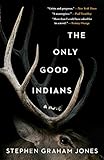 The Only Good Indians by Stephen Graham Jones: A horror story about four men from the Blackfeet Nation who are being hunted for something they did in the past. Paul Tremblay calls this novel “a masterpiece. Intimate, devastating, brutal, terrifying, yet warm and heartbreaking in the best way, Stephen Graham Jones has written a horror novel about injustice and, ultimately, about hope. Not a false, sentimental hope, but the real one, the one that some of us survive and keeps the rest of us going.” (Lydia)
The Only Good Indians by Stephen Graham Jones: A horror story about four men from the Blackfeet Nation who are being hunted for something they did in the past. Paul Tremblay calls this novel “a masterpiece. Intimate, devastating, brutal, terrifying, yet warm and heartbreaking in the best way, Stephen Graham Jones has written a horror novel about injustice and, ultimately, about hope. Not a false, sentimental hope, but the real one, the one that some of us survive and keeps the rest of us going.” (Lydia)
 St. Ivo by Joanna Hershon: Hershon’s last novel, A Dual Inheritance, published seven years ago, was a riveting intergenerational saga covering decades in the lives of two families. In St. Ivo, Hershon narrows the aperture to focus on two couples over the course of a long weekend spent together upstate. “Hershon explores with moving simplicity the complexities friendships and a marriage that has frayed but not yet died,” says Publishers Weekly in an early review. (Michael)
St. Ivo by Joanna Hershon: Hershon’s last novel, A Dual Inheritance, published seven years ago, was a riveting intergenerational saga covering decades in the lives of two families. In St. Ivo, Hershon narrows the aperture to focus on two couples over the course of a long weekend spent together upstate. “Hershon explores with moving simplicity the complexities friendships and a marriage that has frayed but not yet died,” says Publishers Weekly in an early review. (Michael)
 Afterlife by Julia Alvarez: The bestselling author of In the Time of the Butterflies and How the Garcia Girls Lost Their Accents returns with a novel focused on Antonia Vega, a recently retired English professor and writer whose husband unexpectedly dies and whose sister disappears. Soon after these losses, an undocumented and pregnant teen arrives at her door. Luis Alberto Urrea says that Afterlife is “the exact novel we need in this fraught era. A powerful testament of witness and written with audacity and authority.” (Zoë)
Afterlife by Julia Alvarez: The bestselling author of In the Time of the Butterflies and How the Garcia Girls Lost Their Accents returns with a novel focused on Antonia Vega, a recently retired English professor and writer whose husband unexpectedly dies and whose sister disappears. Soon after these losses, an undocumented and pregnant teen arrives at her door. Luis Alberto Urrea says that Afterlife is “the exact novel we need in this fraught era. A powerful testament of witness and written with audacity and authority.” (Zoë)
 Simon the Fiddler by Paulette Jiles: Following up on her National Book Award finalist News of the World, Jiles returns to post-Civil War Texas with the tale of Simon Boudlin, a 23-year-old fiddle player, and Doris Mary Dillion, the indentured Irish girl he meets as the war comes to an end. The novel follows Simon and Doris as they follow their own post-war paths—and the lengths he will go to reunite with the woman he loves. Kirkus‘ starred review calls Jiles a “master storyteller” and the novel “vividly evocative and steeped in American folkways.” (Carolyn)
Simon the Fiddler by Paulette Jiles: Following up on her National Book Award finalist News of the World, Jiles returns to post-Civil War Texas with the tale of Simon Boudlin, a 23-year-old fiddle player, and Doris Mary Dillion, the indentured Irish girl he meets as the war comes to an end. The novel follows Simon and Doris as they follow their own post-war paths—and the lengths he will go to reunite with the woman he loves. Kirkus‘ starred review calls Jiles a “master storyteller” and the novel “vividly evocative and steeped in American folkways.” (Carolyn)
 What You Become in Flight by Ellen O’Connell Whittet: When an injury during rehearsal derails Whittet’s promising ballet career, the 19-year-old turns to writing to work through the loss of the future she’d always envisioned; the years of physical and emotional trauma she suffered (inflicted by herself and others); and the journey she took to heal herself. About the memoir, author Melissa Febos writes: “An elegant and compelling künstlerroman that begins in the body and ends on the page.” (Carolyn)
What You Become in Flight by Ellen O’Connell Whittet: When an injury during rehearsal derails Whittet’s promising ballet career, the 19-year-old turns to writing to work through the loss of the future she’d always envisioned; the years of physical and emotional trauma she suffered (inflicted by herself and others); and the journey she took to heal herself. About the memoir, author Melissa Febos writes: “An elegant and compelling künstlerroman that begins in the body and ends on the page.” (Carolyn)
 Everything Is Under Control by Phyllis Grant: Grant’s debut memoir is a pinch of personal, poetic vignettes and a dash of her favorite recipes. The chef and food writer explores her journey from being a dancer at Julliard and working in high-end kitchens in New York City, to marrying her husband and relocating to California after 9/11. Writer Dani Shapiro says, “With raw candor and discipline, Phyllis Grant peels back the layers of her innermost experience and gives us a memoir as rich and nuanced, as delicate as life itself.” (Carolyn)
Everything Is Under Control by Phyllis Grant: Grant’s debut memoir is a pinch of personal, poetic vignettes and a dash of her favorite recipes. The chef and food writer explores her journey from being a dancer at Julliard and working in high-end kitchens in New York City, to marrying her husband and relocating to California after 9/11. Writer Dani Shapiro says, “With raw candor and discipline, Phyllis Grant peels back the layers of her innermost experience and gives us a memoir as rich and nuanced, as delicate as life itself.” (Carolyn)
 Starling Days by Rowan Hisayo Buchanan: Following her acclaimed debut, Harmless Like You, Buchanan’s second novel follows Mina and Oscar, a married couple who relocate to London after a foiled tragedy. Suffering from mental health issues, Mina finds comfort—and something more—in a woman named Phoebe. Kirkus‘ starred review calls the novel “poetic and understated” and “complex and resonant.” (Carolyn)
Starling Days by Rowan Hisayo Buchanan: Following her acclaimed debut, Harmless Like You, Buchanan’s second novel follows Mina and Oscar, a married couple who relocate to London after a foiled tragedy. Suffering from mental health issues, Mina finds comfort—and something more—in a woman named Phoebe. Kirkus‘ starred review calls the novel “poetic and understated” and “complex and resonant.” (Carolyn)
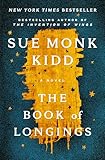 The Book of Longings by Sue Monk Kidd: In her fourth novel, Kidd—the acclaimed author of The Secret Life of Bees—imagines the life of Ana, a young woman who defies her arranged marriage to marry Jesus of Nazareth. Rebellious and intellectually curious, Ana finds her purpose in recording the secret narratives of silenced women—a pursuit that puts her in danger. A starred review in Publishers Weekly called the novel “a vibrant portrait of a woman striving to preserve and celebrate women’s stories—her own and countless others.” (Carolyn)
The Book of Longings by Sue Monk Kidd: In her fourth novel, Kidd—the acclaimed author of The Secret Life of Bees—imagines the life of Ana, a young woman who defies her arranged marriage to marry Jesus of Nazareth. Rebellious and intellectually curious, Ana finds her purpose in recording the secret narratives of silenced women—a pursuit that puts her in danger. A starred review in Publishers Weekly called the novel “a vibrant portrait of a woman striving to preserve and celebrate women’s stories—her own and countless others.” (Carolyn)
 A Thousand Moons by Sebastian Barry: The newest novel from two-time Booker Prize finalist Barry focuses on Winona Cole, the Native American adopted daughter of John Cole and Thomas McNulty—whose lives were explored in his previous novel Days Without End. Set in Reconstruction-era Tennessee, a brutal act of violence sends Winona on a journey—toward healing and connection with her Lakota ancestors. The Guardian‘s review says Barry’s “work reminds us how much we need these rare gifts of the natural storyteller, for reckoning with our past and present.” (Carolyn)
A Thousand Moons by Sebastian Barry: The newest novel from two-time Booker Prize finalist Barry focuses on Winona Cole, the Native American adopted daughter of John Cole and Thomas McNulty—whose lives were explored in his previous novel Days Without End. Set in Reconstruction-era Tennessee, a brutal act of violence sends Winona on a journey—toward healing and connection with her Lakota ancestors. The Guardian‘s review says Barry’s “work reminds us how much we need these rare gifts of the natural storyteller, for reckoning with our past and present.” (Carolyn)
 Sea Wife by Amity Gaige: In Gaige’s fourth novel, a married couple and their two young children take to the sea on a search for adventure and fulfillment. Instead, they find their marriage and lives thrown irreparably and dangerously off course. Claire Messud says, “Taut as a thriller, emotionally precise yet threaded with lyricism, Sea Wife is at once the compelling story of a family’s glorious, misbegotten seafaring adventure and an allegory for life itself.” (Carolyn)
Sea Wife by Amity Gaige: In Gaige’s fourth novel, a married couple and their two young children take to the sea on a search for adventure and fulfillment. Instead, they find their marriage and lives thrown irreparably and dangerously off course. Claire Messud says, “Taut as a thriller, emotionally precise yet threaded with lyricism, Sea Wife is at once the compelling story of a family’s glorious, misbegotten seafaring adventure and an allegory for life itself.” (Carolyn)
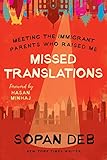 Missed Translations by Sopan Deb: Deb, a New York Times writer and comedian, explores his immigrant roots in this debut memoir. Growing up in suburban (read: white) New Jersey, Deb yearned for a connection to his culture but was ultimately unable to find one after his parent’s marriage imploded and his father returned to India alone. As an adult, he travels to India to reunite with his father, spend time with extended family, and uncover secrets that would otherwise have stayed buried. Booklist says Deb’s writing is “breezy and witty” and that “his earnestness will sweep readers up into this charmer of a memoir.” (Carolyn)
Missed Translations by Sopan Deb: Deb, a New York Times writer and comedian, explores his immigrant roots in this debut memoir. Growing up in suburban (read: white) New Jersey, Deb yearned for a connection to his culture but was ultimately unable to find one after his parent’s marriage imploded and his father returned to India alone. As an adult, he travels to India to reunite with his father, spend time with extended family, and uncover secrets that would otherwise have stayed buried. Booklist says Deb’s writing is “breezy and witty” and that “his earnestness will sweep readers up into this charmer of a memoir.” (Carolyn)
 Five Little Indians by Michelle Good: Winner of the 2018 HarperCollins/UBC Prize for Best New Fiction, Good’s debut novel is told from the alternating perspectives of Kenny, Lucy, Clara, Howie, and Maisie—who are survivors of a church-run residential school. As their lives intersect over the decades, the then teens (now adults) attempt to overcome the trauma inflicted on them and not only survive, but thrive, in downtown Vancouver. (Carolyn)
Five Little Indians by Michelle Good: Winner of the 2018 HarperCollins/UBC Prize for Best New Fiction, Good’s debut novel is told from the alternating perspectives of Kenny, Lucy, Clara, Howie, and Maisie—who are survivors of a church-run residential school. As their lives intersect over the decades, the then teens (now adults) attempt to overcome the trauma inflicted on them and not only survive, but thrive, in downtown Vancouver. (Carolyn)
The post April Preview: The Millions Most Anticipated (This Month) appeared first on The Millions.
Source : April Preview: The Millions Most Anticipated (This Month)


